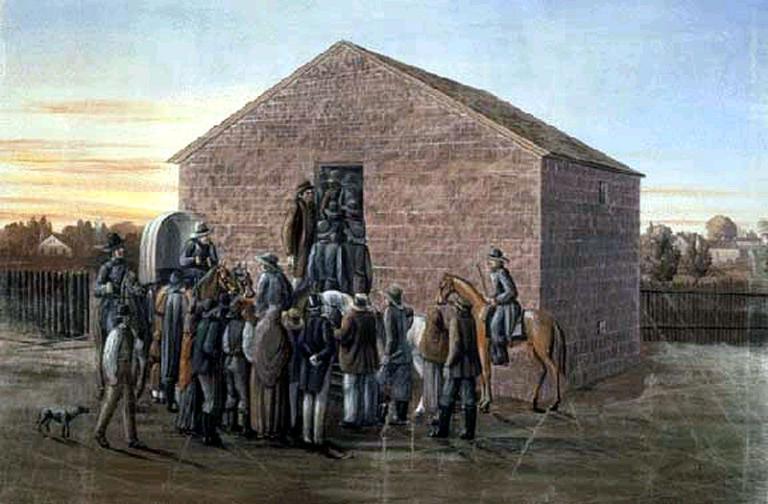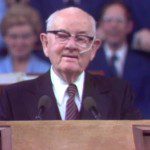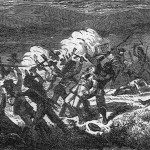
(Wikimedia Commons public domain photo)
We were up early this morning, again — our little family group now at full strength — in order to catch the FRS Clipper from Seattle to Victoria, a favorite little trip of ours through the Salish Sea (specifically through Puget Sound and the Strait of Juan de Fuca). Then we drove up to Nanaimo, where my wife had lined up a place for us on Airbnb. I’m sitting out on the veranda, writing and looking out at the sunset over the Strait of Georgia. (At this point, I need to welcome my fans over at the Peterson Obsession Board, and to tell them that we enjoyed a “Desi Veggie” — using Indian flavors — from Local Pizza. I commend it heartily to anybody who happens to pass through this beautiful neck of the woods.)

(Wikimedia Commons public domain image)
In 1838, Thomas B. Marsh, onetime senior apostle turned bitter apostate — and, many years later, humble returnee to the Saints who had by then settled in the Great Basin West — swore out an affidavit claiming to have heard Joseph Smith say that “he would yet tread down his enemies, and walk over their dead bodies; and if he was not let alone, he would be a second Mohammed to this generation, and that he would make it one gore of blood from the Rocky mountains to the Atlantic ocean; that like Mohammed, whose motto in treating for peace was, ‘the Alcoran or the Sword.’ So should it be eventually with us, ‘Joseph Smith or the Sword.’” (History of the Church, 3:167 note)
Critics often use this alleged statement (and its misrepresentation of Muhammad) to malign Joseph’s character, to portray him as an unprincipled would-be tyrant.
But is it authentic?
Maybe. The so-called “1838 Mormon War” was on. Many Church leaders were falling away, including the Book of Mormon witnesses Oliver Cowdery and David Whitmer (who, however, always reaffirmed their testimony of the plates, the angel, and the affirming voice of God), and apostles such as Marsh and Orson Hyde (who would also return, much sooner than Marsh). The Haun’s Mill Massacre, which left seventeen members of the Church dead, occurred on 30 October. Joseph and Hyrum Smith, along with others, would be condemned to death on 1 November, and then, when Alexander Doniphan refused to obey that order, they were cast into Liberty Jail, where they remained from December 1 until April 6, 1839. Meanwhile, led by Brigham Young, Latter-day Saints fled the state through winter snows, seeking asylum in Illinois.
It’s conceivable that, under such stress, hoping to intimidate Missouri’s anti-Mormons and to persuade them to leave the Saints alone, Joseph Smith might have engaged in exaggerated rhetoric,.
It’s much more likely, though, that the statement is false, wholly or in part. Arnold Green and Lawrence Goldrup remarked in 1971 that “this threat was quite probably a mere fabrication by the disgruntled Marsh.” (See their “’Joseph Smith, an American Muhammad?’ An Essay on the Perils of Historical Analogy,” Dialogue: A Journal of Mormon Thought 6/1, page 47.) “Orson Hyde,” they observe, “who seconded Marsh’s allegations in 1838, had a change of heart the following year and confessed that unspecified portions of the affidavit had been invented by Marsh.”
Joseph Smith’s own journal reports of the period that “some excitement was raised in the adjoining Counties . . . against us, in consequence of the suden departure . . . of the apostates from this Church, into that vicinity reporting false stories, and statements, but when [the Missourians] come to hear the other side of the question their feeling[s] were all allayed upon that subject.” (Dean Jessee, ed., The Papers of Joseph Smith, 2:255-256)
“I became jealous of the Prophet,” Marsh himself remarked around the time of his 1857 Utah rebaptism (a rebaptism that’s difficult to explain if he really considered Joseph Smith a bloodthirsty aspiring dictator), “and then I saw double, and overlooked everything that was right, and spent all my time in looking for the evil. . . . I felt angry and wrathful; and the Spirit of the Lord being gone, as the Scriptures say, I was blinded, and I thought I saw a beam in brother Joseph’s eye, but it was nothing but a mote, and my own eye was filled with the beam; but I thought I saw a beam in his, and I wanted to get it out; and, as brother Heber says, I got mad, and I wanted everybody else to be mad.” (Journal of Discourses 5:207) (It’s frankly difficult in this context not to think of certain apostates of our own era.)
The fact is that Joseph Smith didn’t actually behave in the belligerent manner suggested by this dubious “quotation.” The Latter-day Saints couldn’t have conquered Missouri if they had wanted to, let alone everything from the Atlantic to the Rockies, and Joseph never showed any inclination to try it. After all, he sued for peace in Missouri (and, as a consequence, was arrested and nearly executed). And during the last month of his life, even after his arrest and imprisonment at Carthage Jail—where he was in fact murdered by government militia—he ordered the Nauvoo Legion to stand down.
Joseph probably made a comment about Muhammad in Missouri that Thomas Marsh misheard, misunderstood, or (consciously or not) angrily distorted. David Grua provides seeming corroboration for some such statement in his 2007 essay “Joseph Smith or the Sword!?” http://juvenileinstructor.org/from-the-archives-joseph-smith-or-the-sword/. However, we don’t know whether or not that seeming corroboration represents genuinely independent testimony. And the precise wording of Joseph’s alleged statement is crucial — but, unfortunately, we cannot know it. A secondhand allegation by a hostile witness is an awfully slender thread upon which to base a serious accusation against Joseph Smith and his character.
Posted from Nanaimo, British Columbia













